抗补体因子H的自身抗体和治疗性抗体。
IF 2.8
4区 医学
Q3 IMMUNOLOGY
引用次数: 0
摘要
补体系统是我们免疫防御的重要组成部分,一旦识别,它可以快速有效地杀死病原体。然而,错误的补体激活可能导致宿主组织损伤。因此,对补体系统进行良好的调控是防止附带损害的必要条件。调节是由几种补体抑制蛋白实现的,作用于补体系统的不同水平。其中一种补体调节因子是因子H,它是补体激活途径的主要调节因子。因子H可以调节补体系统的液相和宿主细胞表面,例如,作为因子I的辅助因子,灭活C3b。因子H的功能特性位于蛋白质的不同区域。因子H的功能损害,无论是由于遗传变异,竞争蛋白如因子H相关蛋白和来自某些病原体的蛋白质,还是自身抗体的存在,都会影响补体的激活。然而,确切的结果取决于因子H内受影响的区域。与因子H结合的自身抗体已被证明可抑制因子H的几种调节功能,这在膜增殖性肾小球肾炎和非典型溶血性尿毒症综合征等疾病中观察到。由于最近在其他几种疾病中也发现了抗因子H自身抗体的存在,从自身免疫性疾病到癌症,本文综述了在这些疾病中描述的因子H自身抗体的存在。据报道,因子H自身抗体对因子H具有抑制或增强作用,这取决于所识别的表位。因子H自身抗体在其中一些疾病中的致病性尚未得出正式结论。重要的是,了解抗因子H(自身)抗体的结合和功能影响将允许有针对性的干预,以减少抗因子H自身抗体的病理后果,但也可能为使用抗因子H抗体作为治疗剂开辟额外的途径。本文章由计算机程序翻译,如有差异,请以英文原文为准。
Autoantibodies and therapeutic antibodies against complement factor H
The complement system is a crucial part of our immune defense as, upon recognition, it can kill pathogens fast and effectively. However, misguided complement activation could cause damage to host tissues. Therefore, a well-controlled regulation of the complement system is a necessity to prevent collateral damage. Regulation is achieved by several complement inhibitory proteins, acting at different levels of the complement system. One of these complement regulators is factor H, the main regulator of the alternative complement activation pathway. Factor H can regulate the complement system both in fluid-phase and on the host cell surface by, for example, acting as co-factor for factor I, inactivating C3b. The functional properties of factor H are located within different regions of the protein. Functional impairment of factor H, either because of genetic variants, competing proteins such as the factor H-related proteins and proteins from certain pathogens, but also the presence of autoantibodies will impact on complement activation. However, exact consequences are dependent on the region within factor H that is affected. Autoantibodies binding to factor H have been shown to inhibit several regulatory functions of factor H, which is observed in diseases such as membranoproliferative glomerulonephritis and atypical hemolytic uremic syndrome. As more recently the presence of anti-factor H autoantibodies has also been discovered in several other diseases, ranging from autoimmune diseases to cancer, this review provides an overview of the presence of factor H autoantibodies described in these diseases. Factor H autoantibodies are reported to have inhibitory, or enhancing, effects on factor H, depending on the epitopes that are recognized. Formal conclusions about the pathogenicity of the factor H autoantibodies in some of these diseases cannot be drawn yet. Importantly, understanding the binding and functional impact of anti-factor H (auto)antibodies will allow targeted interventions to diminish pathological consequences of anti-factor H autoantibodies but may also open up additional avenues for the use of anti-factor H antibodies as therapeutic agents.
求助全文
通过发布文献求助,成功后即可免费获取论文全文。
去求助
来源期刊

Immunology letters
医学-免疫学
CiteScore
7.60
自引率
0.00%
发文量
86
审稿时长
44 days
期刊介绍:
Immunology Letters provides a vehicle for the speedy publication of experimental papers, (mini)Reviews and Letters to the Editor addressing all aspects of molecular and cellular immunology. The essential criteria for publication will be clarity, experimental soundness and novelty. Results contradictory to current accepted thinking or ideas divergent from actual dogmas will be considered for publication provided that they are based on solid experimental findings.
Preference will be given to papers of immediate importance to other investigators, either by their experimental data, new ideas or new methodology. Scientific correspondence to the Editor-in-Chief related to the published papers may also be accepted provided that they are short and scientifically relevant to the papers mentioned, in order to provide a continuing forum for discussion.
 求助内容:
求助内容: 应助结果提醒方式:
应助结果提醒方式:


